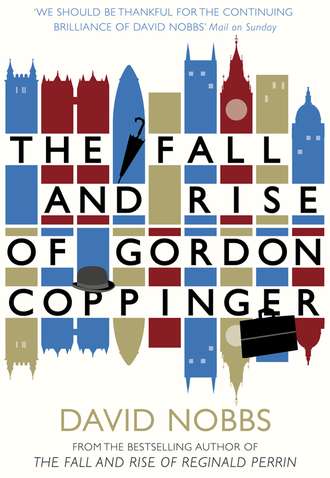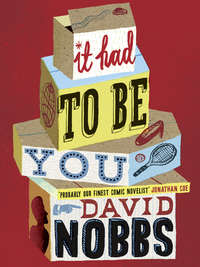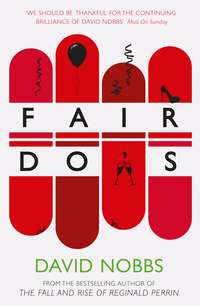
Полная версия
The Fall and Rise of Gordon Coppinger

DAVID NOBBS
The Fall and Rise of Gordon Coppinger

For Briget, Mark and Max
Table of Contents
Title Page
Dedication
So it had come to this
The suspicions that would overwhelm him
It was going to be one of those days
‘I really have shocked myself’
Can we be absolutely certain that they can’t lip-read?
We never said a word about Jack
The evening ended, as it had begun, in silence
A great deal nearer than the Solway Firth
Those insidious doubts
Perhaps we have intruded enough
Staring at himself with astonishment
Not such a useless lump of a nun after all
‘Shame’
His night’s work is done
A serious mistake
‘A perfect memento’
That didn’t make Sir Gordon happy at all
It began to rain
A great deal of pain
He was gone
He might yet be able to save his fortune
‘Siobhan,’ said Sir Gordon, ‘you’re a genius.’
Flat, flat, flat
Back into the real world
An opportunity had been lost
He would need a long, hot bath
There was no chance
It’s wasted already
She is even more astonished
‘I do not listen to your calls. Ever.’
And felt an answering squeeze
What hope is there?
I hope we haven’t
Beyond Gravesend
Fred Upson went pale
What the letters SFN actually stood for
He rather liked bees
A thing that they had never done before
‘I can’t afford to get rid of him’
‘Decision time’
A magic moment
He didn’t think that problem would be any easier
Suddenly he was very sober
The Great Fire of Stoke
‘I’m so sorry’
‘For Jack’
A plan was beginning to take shape
He was fibrillating wildly
It has no future either
And went to bed
The message from his wife
‘Grief makes you very hungry’
No respecter of wealth
Scrambled eggs are his favourite
Acknowledgements
About the Author
Also by David Nobbs
Copyright
About the Publisher
So it had come to this
He woke with a sense of shock. He had no idea who he was. Or where he was. Or who this woman was, sleeping so peacefully beside him.
Oh God. Did he want to know who he was? Would it be an unpleasant surprise?
Later, when he told his doctor, he would estimate that this blankness, this disorientation, this absence of self, probably lasted less than a minute, maybe not even thirty seconds. At the time it seemed like an age.
What he also realized later – and this he didn’t tell his doctor, couldn’t tell his doctor, couldn’t tell another human being ever – was that he had experienced, in that brief moment, the first intimation of doubt. To most of us, plagued as we are by doubt, this may seem incredible, but men like this man – I feel it would be impolite, in a curious way, to give you his name before he himself has remembered it – manage to live without feeling any doubt at all, do things that would be impossible if they felt even a shred of doubt. Garibaldi, Hitler, Colonel Gaddafi, could they have done what they did if they’d had doubts? Not that I am putting our still unnamed hero in that category.
He felt something that he had not felt in his life for a very long time – real alarm. This was extremely disconcerting. He was always so completely in command of himself, prided himself on not needing an alarm clock because his body did what he told it to do; he was always in control, people thought him a control freak.
Well, that was something. That was a piece of knowledge about himself. He was a control freak. But today he was a control freak out of control. He was breaking into a sweat, he could feel the wetness of panic all over his skin.
Memory came back to him in small bits. Somebody calling him Gordon. He was Gordon somebody. This narrowed it down, but it really didn’t help all that much. Then from nowhere, in the utter darkness of the bedroom, there flashed into his mind a vivid memory of Mr Forbes-Harrison, his maths teacher, calling out, in a grim yard behind a grim school on a grim, grey morning, ‘You, Coppinger, where do you think you’re going?’ to which he had replied, to his own astonishment, as well as Mr Forbes-Harrison’s, ‘To the very top, sir.’
And with that ‘sir’ there came the thought that he hadn’t called anybody ‘sir’ for a very long time. People called him ‘sir’ now. He wasn’t just Gordon Coppinger. He was Sir Gordon Coppinger.
Now complete awareness flooded in, astonishing him. He was a great man and a rich one. He was a financier and an industrialist with a finger in many pies, ‘not all of which are steak and kidney’, as he used to say only too often, to prove that he still had a sense of humour, though many people thought it proved that he hadn’t. He owned the twenty-six-storey Coppinger Tower in Canary Wharf. In his huge and luxurious yacht, the Lady Christina, based in Cannes, he gave holidays every summer to men of power and influence.
He was a patriot and a philanthropist. He had created the Sir Gordon Coppinger Charitable Foundation, which supported many good causes. He owned the Coppinger Collection, which housed many masterpieces. The football team that he owned played at the Coppinger Stadium. It was time to get up.
Or was it? Not quite yet, perhaps. He knew who he was now, but he still wasn’t sure where he was. The darkness in the room was absolute, which suggested that he was at home, in the vast master bedroom, with its thick gold curtains and its thermal blinds. But suggestion wasn’t enough. He needed to know.
The question of where he was had no great importance in itself, beyond the necessity of finding a light switch or risk walking in the blackness straight into a row of wire coat hangers in some hotel bedroom, as had happened to a friend of his. Make that an acquaintance of his. He didn’t do friends. But until he knew where he was he couldn’t be sure of the identity of the woman who was sleeping so quietly beside him.
If it was a woman. But that had all been a very long time ago, and, surely, if it was a man, after all this time, he would have remembered. No, it was a woman. Her gentle breathing was unmistakably female.
Just occasionally, the soft breathing became a faint, whistled, wistful snore, as if she was thinking, Surely my life should be happier than this? No man’s snore could come with so many fancy adjectives attached to it. Male snores were loud, or beery, or catarrhal. Male snores were simple.
Were these slight snores Lady Coppinger’s? He wasn’t sure. Was he in the master bedroom of Rose Cottage, the cottage being ironic, and the rose reflecting Her Ladyship’s greatest interest? Or was he in a hotel? Was this woman Francesca? Or Mandy? Please let him not be in Mandy’s flat. He sniffed. No, he wasn’t in Mandy’s flat. There was a faintly unpleasant smell of stale humanity in the room, but Mandy’s flat smelt of drains – distant drains, but unmistakable.
How could he ever have been so unwise as to go to bed with a woman called Mandy? Few names had more baggage attached to them, few names screamed ‘tabloid press’ as much as Mandy. He had been lucky to get away with it this long. Mandy must go.
He was wide awake now, and shocked by the timidity of his thoughts. Her name was half the point of Mandy. The risk was everything. Was he going soft? He felt for his prick. Yes, he was, but that wasn’t what he’d meant.
He tried to remember the events of the previous evening, but they stubbornly refused to come. Had he made love? He didn’t think so. That suggested, but didn’t prove, that he was with his wife. The fact that he couldn’t remember also seemed to indicate, but again didn’t prove, that he’d endured an ordinary Sunday evening at home.
Yes! They’d been watching the Antiques Roadshow. He’d said, ‘Bloody morons, they’ve had it for thirty-five years and they haven’t even noticed the maker’s name’; she’d told him to shut up in a very unladylike tone; he’d said, ‘I wish he’d break that fucking vase over Fiona Bruce’s head’; she’d said, ‘If you’re going to be unpleasant leave me alone’; and then not half an hour later she’d ticked him off for not wanting to watch Downton Abbey with her. Downton Abbey! He’d explained that life was too short to bother with things that hadn’t happened to people who’d never existed. She’d shouted, like a fishwife – was that fair on fishwives, if such people still existed? – that he was ruining her Sunday evening.
Yes, he was at home.
Lady Coppinger had watched Downton Abbey; he’d trawled the Net looking for references to himself, while slowly sipping a large glass of the sixteen-year-old Lagavulin and wondering from what revolting bottle Jack was seeking oblivion at that very moment, under some bridge or in some dark alley. Then he’d slipped quietly into bed beside Her Ladyship, planted the obligatory kiss on her cheek so softly that it could not possibly arouse her, switched the light off and gone straight into guiltless sleep, while she’d read a bit of some soppily romantic book by some much-loved authoress who in real life had been such a frightful snobbish bitch that she’d have been drummed out of Dudley with disdain.
He was at home with Christina. A cocktail of relief and disappointment swept over him, and suddenly he recalled the date and realized why he had felt that this was an important day. It was 31 October. Halloween. His wife’s birthday.
Yes, he had married a witch.
No, he hadn’t married a witch. That had been their little joke. It wasn’t a joke now. She hadn’t been a witch when he’d met her. She’d been as lovely and as full of promise as the dawn. She hadn’t been a witch when he’d courted her, proposed to her, married her. She had been his innocence. He had turned her into a witch. He had fucked his own innocence.
He didn’t like these thoughts, and he wasn’t used to having thoughts that he didn’t like. It was time to get up.
But he didn’t. His body still didn’t stir.
This was dreadful. Regret could play no part in his life. There wasn’t time for regret. Besides, he had everything he wanted. How can a man have regrets if he has everything he wants? Because he didn’t want to have everything he wanted? That was ridiculous. Because he didn’t actually have everything he wanted? Because it was impossible to have everything you wanted, because what you wanted came attached to what you didn’t want, as in fame and photographers?
Photographers! If he had known what was to come!
And yet – and again this only occurred to him afterwards – that morning he did have at least an inkling of what was to come. He had a presentiment. Perhaps, he would suggest to his doctor later, his blankness had been caused by his having, subconsciously, a presentiment that he was going to have a presentiment. His doctor, who was Scottish, would say that was a bit too fanciful for him. He would say that there must have been a physical cause, the position he had slept in, the supply of blood, maybe even some kind of very minor stroke. He would suggest tests. Sir Gordon would pretend to agree.
At last he began to move, easing himself slowly out of the king-sized bed. He padded carefully across the thick, luscious carpet in the utter blackness. He knew from long experience the exact position of the door. He placed his hand on the handle, turned it ever so slowly.
Lady Coppinger gave a low moan which seemed to Sir Gordon to be a rebuke of cosmic proportions, but she didn’t wake.
He was relieved that his wife was still asleep, that he didn’t have to face her yet.
So it had come to this.
The suspicions that would overwhelm him
He seated himself at the round rosewood (what else?) dining table in the exact centre of the gigantic dining room, whose panelling was as Elizabethan as it could be in a house built in 1932. The table seated twelve, and most mornings, as he breakfasted in solitary splendour, he derived pleasure from the sight of the eleven empty places.
He was smartly dressed in the clothes Lady Coppinger had laid out for him the previous evening. He had no colour sense. She did. You couldn’t breed roses without having a colour sense.
Farringdon emerged from the kitchens and slid gravely towards Sir Gordon like a stately home on legs. He carried a glass of freshly squeezed orange juice and a pile of newspapers. Sir Gordon, who was still feeling quite deeply disturbed by his lapse of memory, tried to look the essence of calm, and gave a small, studied smile.
‘Good morning, Farringdon,’ he said, and he thought he detected a slight nervous quiver in his voice. Farringdon didn’t appear to notice it, but then Farringdon would not have appeared to notice it if his employer had come in to breakfast naked. In the early days Sir Gordon had been slightly unnerved by Farringdon’s eyes. There never seemed to be any expression in them. It looked, in certain lights, from certain angles, as if he had two glass eyes. Sir Gordon was used to this now. He found it restful.
‘Good morning, sir. Sir has slept well?’ said Farringdon gravely.
‘Sir has slept very well, thank you, Farringdon.’
‘That is good news, sir.’
The politenesses over, Farringdon got straight down to business, listing for Sir Gordon, in the unchanging daily ritual, all the pages of the newspapers that mentioned him: ‘Telegraph page seven, Times business page two, Sun page two—’
‘Opposite the totty!’
‘Indeed, sir.’
‘Mirror page twenty-seven—’
‘Page twenty-seven! That’s a bit far back.’
‘Indeed, sir, but perhaps the fact that it is a page lead will assuage the disappointment.’
Sir Gordon wasn’t given to idle speculation, but even he did wonder sometimes if Farringdon had once discovered a night-school course on the Language of Butlers.
Farringdon went on to list articles in the newspapers that the team judged to be of relevance to Sir Gordon, mainly from the business sections. Important though their impact on his day’s decisions might be, he would only turn to those after he had finished reading about himself.
Sir Gordon took it entirely for granted that several of his employees had been up since three in the morning, driving the early editions of the papers down to Surrey, where other early risers had hunted through them for stories relevant to himself; while yet more, in London, were at their computers finding and collating references to him on Twitter, YouTube, Facebook and, only slightly less important, news bulletins. He thought that his researchers trawled through every page of every paper. He hadn’t heard of Google Alert.
He began the process of opening the newspapers at the pages that Farringdon had listed, and which he had not needed to write down. Sir Gordon was proud of his memory. His eyes swept contemptuously past several headlines that told of the sad state of our world in the autumn of 2011. Air-disaster fears soar as laser louts blind pilots. Thieves desecrate memorials to our war heroes every two days. Nineteen glasses of wine by the age of twelve. The behaviour of the lower orders from whom he had so thoroughly escaped was of no interest to him.
He found the first reference to himself in the business section’s editorial comment:
Rumour has it that the City is bracing itself for a disappointing set of results from SFN Holdings. While this is not particularly significant in itself, SFN being a fairly small player in the global game, any bad news from the Coppinger empire is bound to be …
Farringdon arrived with a pot of tea, a jug of water, and a bowl of Coco Pops. Sir Gordon had a proudly sweet tooth.
‘Thank you, Farringdon. English Builders’ Tea, the best drink in the world.’
Farringdon raised his eyebrows in agreement. Agreement would have figured largely in his job description, had there been one.
‘You can keep your champagne.’
Again Farringdon, who had no champagne to keep, raised his eyebrows in agreement, and moved off, in his slightly bent, tactful way. He was three inches taller than Sir Gordon, and found it sensible not to emphasize the fact.
… destabilizing at this sensitive time. Also, SFN is believed to be close to Sir Gordon Coppinger’s heart, if such an organ can be located, as it is in his native and beloved Dudley.
‘If such an organ can be located!’ Cheeky bugger. Rather flattering, though. Except … wasn’t he loved, despite his wealth, despite his ruthlessness, because he was British, not Russian or Chinese? A British oligarch. A walking assertion that Britons can still become rich. A patriot. And famously possessed of charm. When he wanted it. When he needed it. Which was most of the time. Which could become irksome.
But could it be – no, it wasn’t possible – that the press were beginning to attack him, to test the waters? And why print these comments anyway, if not to destabilize? They must know that SFN Holdings made a loss every year, though he hoped that they didn’t know that making a loss every year was the whole point of SFN Holdings.
By the time Farringdon returned with the crispy bacon and scrambled eggs, Sir Gordon had already located another story about himself. Well, this one was about Lady Coppinger, variously described in the press as fragrant, elegant, enigmatic – what a gift she was to the world of adjectives, and to imagery taken from roses, as in the headline to this particular story.
A PIECE OF CAKE FOR THORNY CHRISTINA
It’s a long road from selling Battenburg cake to breeding the champion climbing rose at the Baden-Baden October Flower Festival, but even that honour couldn’t make Sir Gordon Coppinger’s elegant wife Christina smile for long.
My German friend Gisela informed me yesterday that Christina didn’t win many hearts as she accepted the prestigious Der Meisteroktoberbergsteinerrosigpreis for her George Clooney Perpetua, named after her favourite film star.
She popped in to the famous and elegant German spa town by private …
‘Thank, you, Farringdon.’
… jet, made a brief speech without using a single word of German, and popped out as fast as her long but no longer quite so slim legs could carry her.
Gisela informs me that Christina did not endear herself to her hosts by wearing her Remembrance poppy throughout.
Can it be that the former confectioner’s assistant and beauty queen – she was voted Miss Lemon Drizzle in 1980, Miss Danish Pastry (West Midlands) in 1982 and Miss West Bromwich in 1983 – was anxious to show her husband that she shares his fanatical xenophobia, or was there perhaps a more personal reason for the brevity of her visit?
Did she feel that she needed to get back to find out what Sir Gordon was up to?
Sir Gordon smiled. She would hate that. She would be furious at the slur cast on her famous legs. She would loathe the references to her days as a beauty queen. How the world would mock. Didn’t she have the sense to see that the whole point of their lives was that they had gone up, up, up and so it was great publicity that they had once been down, down, down? Even Miss Lemon Drizzle can dream of leaving the world of cake far behind and breeding world-class roses. Christina could have been a heroine for our times, a walking representative, in her high heels, on her long but no longer quite so slim legs, of the social mobility so loved by prime ministers who had been to Eton.
And, to his great surprise, he felt a distant flicker of sexuality at the reference to those legs. He even felt stimulated by the thought that they were no longer quite so slim. Few men are turned on by perfection. You couldn’t believe what was in the papers but it might be rather exciting to check on the accuracy of the observation. Good God. Was it possible – was it? – that this year his birthday dinner with her would not be an ordeal?
But … this apparently trivial diary entry also worried Sir Gordon just a little as he ate his exquisite, always exquisite, bacon and scrambled eggs. He didn’t like that phrase, ‘what Sir Gordon was up to’.
What he had been up to was Francesca Saltmarsh. He had taken the rare opportunity, while Christina was abroad, of staying the night. They had made love three and a half times. That half haunted him. Was he beginning to grow old?
Could the press possibly have known about Francesca? No. It was just a shot in the dark. No! If the worst they could come up with was a snide suggestion in a little diary piece, he had nothing to worry about. He was invulnerable, as his fellow ‘Sir,’ Jimmy Savile, had been, because the great British public would not allow him to be attacked. They loved him so much, just as much as he in his turn hated them.
No, his concerns were exaggerated. A second cup of good old British tea, and the world would be fine again.
But as he turned to the third article about himself, his world felt not quite so fine.
Climthorpe United’s challenge for promotion to the Premiership faltered when they were held to a goalless draw by lowly Barnsley at the Coppinger Stadium in yesterday’s late kick-off.
The Gordoners missed a hatful of chances, the best of which fell to taciturn Bulgarian striker Raduslav Bogoff. The fans in the Abattoir Stand have started to boo him every time he touches the ball, and the same message comes from the increasing number of placards being paraded around the ground. Their message wouldn’t be shortlisted for the Man Booker Prize, but it gets its point across clearly and simply: “Bogoff, Bogoff.”
Manager Vernon Thickness continues to defend the moody target man from the Black Sea resort of Varna. “He gives us different options, which the punters can’t always appreciate,” he explained in his post-match press conference. “He’s creating the chances, and the goals will come.”
Does Thickness really believe this, or is he no more than a mouthpiece for owner Sir Gordon Coppinger’s ideas? And why does Sir Gordon persist with the surly Slav, when it is his express intention eventually to turn Climthorpe into the only all-British side in the Championship, and, whatever his motives may be, we have to applaud that intention.
Sir Gordon has stated that the clumsy seasider gives the team a dimension of subtlety which brings out the best in his British teammates. “I am British through and through and have got rid of no fewer than eight foreign players since I bought the club,” Sir Gordon explained recently, “but I haven’t yet found a British striker who gives me exactly what Raduslav offers.”







